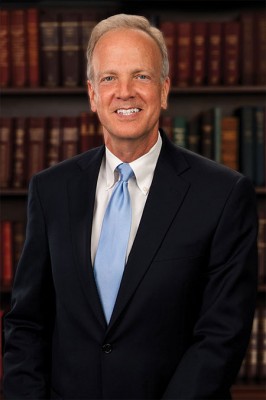U.S. Senator Jerry Moran understands the importance of community. And, he recognizes the need for local pharmacies within those communities.
“It is that kind of hometown feel, that personal touch, where you know your patients and you know your customers that is so important,” Sen. Moran of Kansas said when he spoke at the 2012 PBA Health Conference.
From a small town himself, Sen. Moran wants to preserve the singular way of life that exists in small towns and rural America—that includes supporting local community pharmacies so they don’t have to close their doors.
After all, pharmacy has its roots on small town Main Street. Back when the drugstore served as the social hub of the town, people came to sip malts and gossip at the soda fountain. They stopped by the local pharmacy to get health advice. And, they of course came to the drugstore to pick up medicines specially compounded by their knowledgeable pharmacist.
In small towns across the nation today that sense of kinship, with the community pharmacy at the core, still exists. Unlike many politicians, Sen. Moran sees the importance of keeping that hometown feeling alive. “We live our lives in communities across our regions in small town and rural America in a pretty special way. One that’s worth trying to keep around a while longer,” he said.
A small town beginning
Sen. Moran grew up in Plainville, Kansas. Then a town of 1,900 people, today Plainville’s population includes 2,200 people and one local pharmacy that serves the entire community. When Sen. Moran was growing up during the 1950s and 1960s, the town had two community pharmacies, one of which was where he had his first job—sweeping floors and running errands for $2 a week.
His interest in politics stemmed from a concern that small towns like the one he grew up in, and the local businesses in them, were disappearing. With them that distinct way of life that only exists in rural communities was also vanishing.
“I want to make sure that the way we live our lives out here is something that’s around for a while longer. That it’s preserved. And, that there’s another generation who have the opportunity for their kids and grandkids to live in the community that they grew up in,” he said.
The importance of healthcare
Before Sen. Moran was elected to the U.S. Senate in 2010, he served seven terms in the U.S. House of Representatives and eight years in the Kansas Senate. During that time it quickly became clear to him that healthcare was at the forefront of the significant issues facing the country, and especially for the small town communities that he wanted to preserve.
“Young people don’t want to live in a community in which they can’t feel comfortable about the healthcare that’s going to be available for their children,” he said. “Senior citizens, who comprise a lot of our rural communities across the region have to move where there is a doctor and a hospital and access to healthcare.” “I got involved and interested in healthcare as a result of wanting to see that rural America had a bright future,” he said.
In 2009 Kansas was facing a significant shortage of pharmacists throughout the state, especially in rural communities. Sen. Moran supported the Kansas Legislature appropriating funds for a major expansion of the University of Kansas School of Pharmacy locations in Wichita, Kansas and Lawrence, Kansas.
At that time eight counties in Kansas had no pharmacies at all, and others were significantly underserved. “In the absence of a pharmacist in those eight counties, and the other places in which there was a great lack of pharmacy services, we lose the access to healthcare that is so important to the well-being of citizens of our state and citizens of our country,” he said.
The funding, which went through, enabled the school to accept nearly double the amount of students it previously could. “I got involved in the pharmacy aspect of healthcare knowing that in the absence of a pharmacist that the quality of life of both that individual and that individual’s community begins to diminish,” he said.
A pharmacist’s view
Mike Burns, R.Ph, president and CEO at AuBurn Pharmacies, which has locations across Kansas and Missouri, has experienced Sen. Moran’s genuine concern for community pharmacies firsthand. Burns first met Sen. Moran at a Rotary Club event in Garnett, Kansas, where they discussed pharmacy issues and Burns invited the senator to visit his pharmacy.
“On several subsequent visits through Garnett, Congressman Moran stopped by the pharmacy as promised and we again visited about many issues, but mainly pharmacy,” Burns said. “He had always voiced his support for community pharmacy, and community healthcare in general, and the need for access to that care by citizens in Kansas.” “I’ve been following and supporting him for many years now,” Burns said. “I’ve found that he really does have an understanding of the issues facing community pharmacies today.”
An advocate for pharmacy
Sen. Moran has backed key legislation to help ease the challenges facing community pharmacists and their patients.
He sponsored the Community Pharmacy Fairness Act of 2009, which aimed to help community pharmacies negotiate better contracts for their businesses and their patients. The bill sought to help build a more equal balance between community pharmacies and PBMs by creating a narrow exemption to the current antitrust law.
Sen. Moran also supported important legislation to ease burdensome regulations for small pharmacies that supply durable medical equipment to patients. The bill aimed to exempt pharmacies from the accreditation requirements, which include significant fees, for supplying medical equipment. Other medical professionals including physicians, nurse practitioners
and opticians were already exempt from the requirements.
For all community pharmacies, the issue of PBM transparency is a hot one. In 2011, Sen. Moran sponsored Senate Bill 1058: Pharmacy Competition and Consumer Choice Act of 2011, which aimed to ensure transparency, accountability and competition among PBMs to provide cost-savings to patients across the nation. The bill would also help safeguard access to patients’ preferred pharmacy. “I’m a believer in the free market system,” Sen. Moran said. “But it only works if there’s competition.”
“If you narrow those that are making the decisions about what program and what drug and how much it costs to just a handful of folks with significant economic power, the free market system will not be the free market system and the result will not be the best price and the most choice—much to the detriment of community pharmacists.”
Spread the word
Sen. Moran also participates in regular events to educate politicians on issues surrounding community pharmacy.
In August 2012, he arranged for Marilyn Tavenner, acting administrator of the Centers for Medicare and Medicaid Services (CMS), to tour several healthcare providers in Kansas to learn more about the unique challenges they face.
During the tour she listened and answered questions posed by attendees of the Kansas Pharmacy Summit, a meeting that brings together members of pharmacist and physician associations, as well as PBM representatives and others, to discuss pharmacy issues.
“I go to my pharmacy to get all of my education and information,” Tavenner said. “I think there is a big role for pharmacists.”
Among other issues, Tavenner answered pharmacists’ concerns about the possible gaps in access to care for patients if the issue of a professional dispensing fee is not addressed.
“We have expanded some of our staffing in Medicaid because we knew that states were going to get more creative around waivers,” she said.
“They were going to get more creative around their approach to pharmacy and pharmacy pricing. So we have added some staff, including pharmacists, to try to help.”
Making a difference
Perhaps one of the best ways Sen. Moran has advocated for community pharmacists is by giving them a voice.
In 2011, Sen. Moran helped create the first ever U.S. Senate Community Pharmacy Caucus. The purpose of the caucus is to promote community pharmacy issues, while also serving as a clearinghouse for ideas and information about the important role community pharmacies play in the delivery of healthcare. The caucus complements the Congressional Community Pharmacy Caucus, which Sen. Moran helped found in 2007 as a member of the U.S. House of Representatives.
The caucus brings members of Congress together to hear about community pharmacy issues directly from the source—the pharmacists. One recent event featured a pharmacist from Kansas and a pharmacist from Montana. The pharmacists spoke to members of various senators’ staff about what it’s like to earn a living as a community pharmacist. “You might think that’s something that people would know, but it’s not,” Sen. Moran, who serves as co-chairman of the caucus, said.
Politicians in Washington, D.C. don’t understand what it’s like to face the issue of not having basic services, like a pharmacy or a grocery store, in their town. They don’t realize that could ever be an issue, Sen. Moran said. “So, telling that story is the purpose of the caucus,” he said.
Mike Burns of AuBurn Pharmacies recognizes Sen. Moran’s efforts to advocate for small town businesses, such as pharmacies, in Washington, D.C. “Sen. Moran has helped to at least open other legislators’ eyes to what goes on in the real world of rural America and the small businesses in it,” he said. “His efforts have given me hope that there are legislators that care,” he said. “Sen. Moran has become my ‘voice of reason’ in Washington.”













